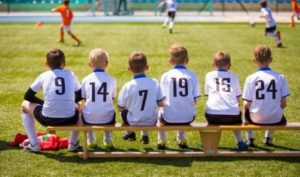Whether a pastime or played at a professional level, sport is facing a very real crisis : sexual abuse, and children, seen as easy targets, are among the first victims.
Whatever someone’s age may be, doing one or several sports is supposed to foster personal development. This is all the more true for children to whom sport shows the values of learning and respect which it is essential to convey from a very early age.
Knowing that children often see their coaches as an example or a role model, such abuse is completely unacceptable. The consequences of sexual abuse by paedophiles during sporting activities are all the more distressing as they go directly against the principles that sport conveys : psychologically (unhappiness, anxiety, depression), socially (isolation, withdrawal, irritability), academically (performance, concentration), or even physically (sleeping and eating problems, headaches).
Yet, this problem is still a taboo subject ; speaking about it is still the best way to break the law of silence.
What is sexual abuse ?
If it is essential to define what falls within the scope of sexual abuse, this is because a large number of victims refuse to lodge a complaint against their attackers. At times they are not even able to say if what they have been subjected to constitutes such an act.
In their World report on violence and health, the World Health Organisation (WHO) specifies that the sexual act itself but also the attempt to obtain such an act are considered as sexual abuse.
Sexual abuse can be divided into three categories, comprising:
- Sexual assaults are attacks committed by the perpetrator using force, threats, restraint or surprise on their victim (e.g. rape and/or sexual touching)
- Sexual abuse consists of acts committed following the grooming of the victim by which the predator causes the victim to become dependent on them by building their trust. The trap results in these children losing their boundaries, who then do not defend themselves and simply do not understand what is happening to them: a lack of understanding which does not mean, in any way, that they consent to sexual relations.
These first two categories involve a sexual act committed using violence (sexual assault) or without (sexual abuse).
- Sexual harassment : in this case even though violence is involved, there is no sexual act. Sexual harassment is characterised by the fact that sexually suggestive remarks or behaviour are forced repeatedly upon a child, even blackmail whether or not this is repeated, for the purpose of obtaining sexual favours.
More severe sentences ; the example of France.

Nonetheless, we should bear in mind that each one of these acts is against the law and carries severe criminal penalties. Moreover, the penalties are increased when the victim is a minor or when the perpetrator is a person abusing the authority their position gives them (e.g. a coach or a sports instructor).
For instance, rape is a crime punishable by 20 years’ imprisonment when it is committed against a minor below the age of 15 (article 222-24 2º of the French Penal Code). That same sentence applies when the rape is committed by a person abusing the authority their position gives them and this regardless of the victim’s age (article 222-24 5º of the French Penal Code). It should be understood that the perpetrator of attempted rape is liable to the same sentence as the perpetrator of rape (article 121-4 of the French Penal Code).
Sexual assaults other than rape are offences punishable by ten years’ imprisonment and a fine of €150,000 when they are committed against a minor under the age of 15 (article 222-29-1 of the French Penal Code) and by seven years’ imprisonment and a fine of €100,000 when they are committed by a person abusing the authority their position gives them (article 222-28 of the French Penal Code).
Furthermore, an adult engaging in non-violent sexual abuse with a minor under the age of 15, and not using restraint, threats or surprise, is committing an offence punishable by five years’ imprisonment and a fine of €75,000 (article 227-25 of the French Penal Code). Sexual abuse is punishable by ten years of imprisonment and a fine of €150,000 when it is committed by a person abusing the authority their position gives them (article 227-26 of the French Penal Code) reduced to three years’ imprisonment and a fine of €45,000 when the victim is a minor over the age of 15 (article 227-27 of the French Penal Code).
Lastly, sexual harassment is an offence punishable by three years’ imprisonment and a fine of €45,000 when it is committed by a person abusing the authority their position gives them or against a minor under the age of 15 (article 222-33 of the French Penal Code).
Freedom to speak out ; a need to break the law of silence.
 As with cases of paedophilia in the Church, sexual abuse in sport is still a taboo subject leading to two conclusions : the protection of the perpetrators by the sporting environment and the fact that victims’ voices are not believed.
As with cases of paedophilia in the Church, sexual abuse in sport is still a taboo subject leading to two conclusions : the protection of the perpetrators by the sporting environment and the fact that victims’ voices are not believed.
This is a law of silence which helps to increase children’s psychological suffering when their defences have already been greatly weakened by the unpardonable offences committed against them.
The responsibility of witnesses to sexual abuse against children is even more important bearing in mind that children are vulnerable due to their age and the close relationship created with their attacker and their obedience of them.
Vulnerability is also a legal concept. In France, it appears in article 434-3 of the French Penal Code du Code, which provides that ‘the failure of anyone, having knowledge of deprivation, maltreatment or sexual assault or abuse inflicted upon a minor or a person unable to protect themselves due to their age, illness, disability, physical impairment, psychological disability or pregnancy, to report this to the judicial or administrative authorities is punishable by three years’ imprisonment and a fine of €45,000’.
Furthermore, when it concerns a crime committed against a child, failure to report this crime is punishable by three years’ imprisonment and a fine of €45,000 (article 434-1 of the French Penal Code).
In the same way, failure to help a person in danger which relates to cases where a person knowingly fails to prevent a crime from being committed or an offence against a person’s bodily integrity is punishable by five years’ imprisonment and a fine of €75,000 (article 223-6 of the French Penal Code).
Whom should you contact ?
It is essential for victims of sexual abuse – or witnesses thereto – to be willing to speak about the abuse they have experienced to their families or to the appropriate authorities.
In the case of France, for victims or witnesses of such acts, a special number has been established by the public authorities. It is a call number where people can speak freely (08 842 846 37) It is possible to call 365 days a year from 9.00 a.m. to 9.00 p.m. for the price of a local call and is anonymous.
Furthermore and all over the world, many associations exist to assist victims and support them in their efforts to obtain redress.
Although it is not possible to mention all of them, the French association ‘Colosse aux pieds d’argiles’ (Idol with feet of clay) – created by Sébastien Boueilh, himself victims of paedophile abuse – is dedicated to the prevention and raising awareness of the risks of paedophilia in the sporting environment (link to the association’s website). It also provides a number where you can get information, help and someone to listen (07 50 85 47 10).
In the UK, a governmental body has been put in place to deal with the issue. The Child Protection in Sport Unit of the National Society for the Prevention of Cruelty to Children has established a number of policies and provides guidance to sport professionals as well as organisations in order to prevent and reduce sexual abuse in sport. A ChildLine is available on (0800 1111) for children seeking help and anybody worried about a child can contact the helpline on (0808 800 5000).
Written by : Emilie Choux Proofreading by : Faiz Kermani Translation by: Alison Tomblin |
http://ile-de-france.drjscs.gouv.fr/sites/ile-de-france.drjscs.gouv.fr/IMG/pdf/dosddpresseharceltsexuel.pdf
http://sports.gouv.fr/IMG/pdf/guidejuridique.pdf
http://www.irbms.com/download/documents/agressions-sexuelles-en-milieu-sportif.pdf
http://www.anne-jolly.com/publications/articles/Rapport_2009.pdf



